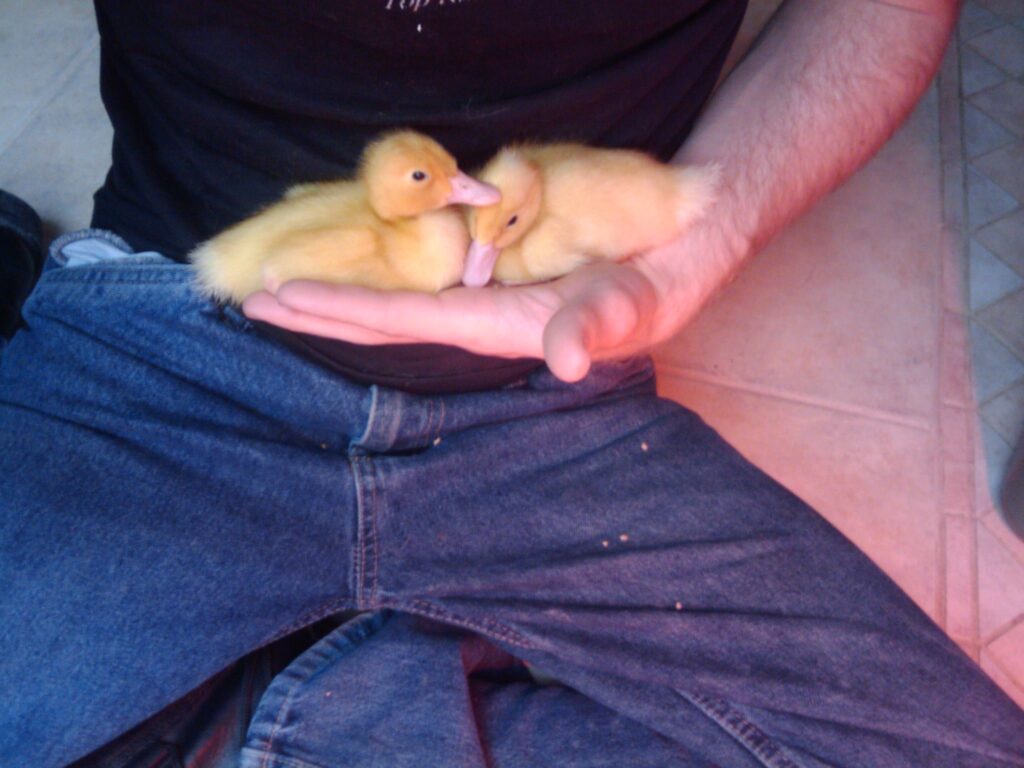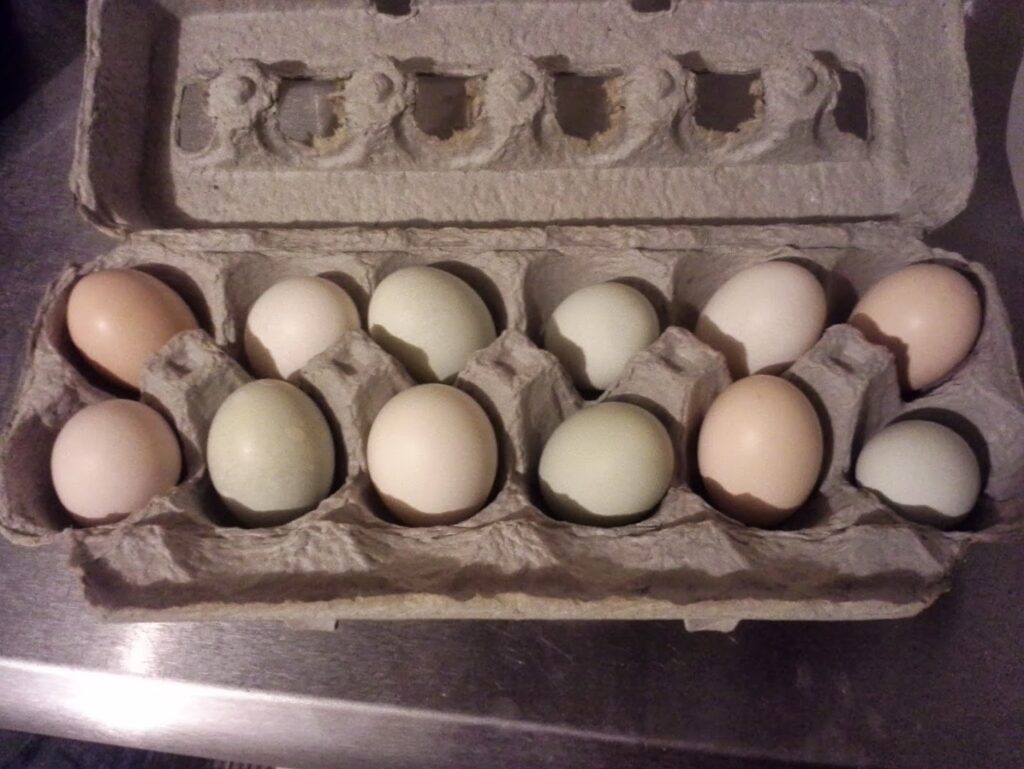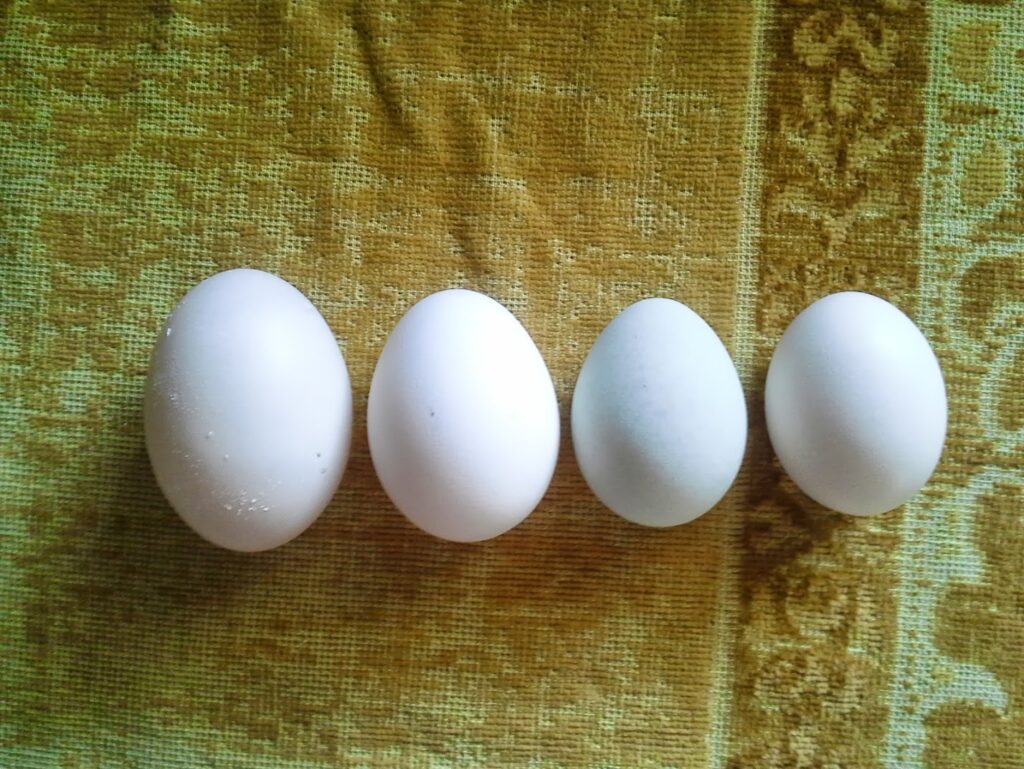2023 is the Year for Ducks – Why ducks?
For us, that is. We knew we wanted to go bigger this year—to sell eggs at the farmers’ market for the first time. Equipped with over a decade of suburban small flock knowledge, we forged forward to our next poultry adventure! We originally started our journey with guinea hens (what a nightmare), moved on to the allure of bantam chickens, and then added 2 ducks to the mix just for fun. Later we tried 2 separate flocks, 20 full sized mixed hens on one side, and 28 birds for meat on the other.
We recently moved to the edge of the country and started over with a small flock of mixed breed chickens just for eggs and… 2 ducks again for entertainment. But we’ve changed gears this year. All Ducks. Why? Here’s our list of why we walked away from chickens and went all in on ducks.


Market for Eggs
It made sense to us. If our primary reason for upgrading and upscaling our little family farm is to make some extra money, then the value of the eggs should be on the list for consideration. Duck eggs have more of a niche market.
You don’t normally see duck eggs at your local Walmart, or even Whole Foods. Duck eggs contain a higher percentage of fat, which is why bakers tend to be the primary customers who are always on the look-out for duck eggs due to how they perform v.s. chicken eggs when used in baked goods. Duck eggs sell at a premium due to their availability. We have typically seen duck eggs sell for about twice the price of chicken eggs or the same price, but with half as many eggs.
Every time we frequent a farmers’ market, whether it be to purchase or to sell, the egg vendors always sell out. Since there’s still a good market for chicken eggs as well as duck eggs, albeit at a 2 to 1 price ratio duck to chicken, I’ll award points to both challengers in that ratio.
Round Winner – Ducks.
Ducks V.S. Chicken score thus far: Ducks 2 ![]()
![]() | Chickens 1
| Chickens 1 ![]()


Egg Production
Close on the heels of market demand would be: how many eggs-per-year does a duck lay versus a chicken? Now this all depends on what breed of bird. Both duck and chicken laying frequency varies widely but just a quick google search (or maybe I should be promoting duckduckgo.com lol) thankfully provides us with so many other’s experience and research. In less than a minute of our time, we have definitive answers. Score! It would appear that the best chicken egg production from the first page on the search comes in at 320+ eggs-per-year by the Lohmann Brown Chicken. Nice job!
You’re up to bat duckies. Where do you come in? The 1st site I visited clocked the Khaki Campbell duck at 280 eggs-per-year but the 2nd site I visited (which happened to be the site I ordered my ducks from) clocked them at upwards of 340 eggs-per-year! Holy smokes! Now… I understand that someone in the business of selling a product might inflate or use the upper most maximum to tantalize their customers into the purchase. So, I’ll call this one a tie. Both challengers received equal marks.
Round Winner – Tie!
Ducks V.S. Chicken score thus far: Ducks 3 ![]()
![]()
![]() | Chickens 2
| Chickens 2 ![]()
![]()

Who Makes the Most Noise?
Roosters
When considering birds at any point, I would encourage you to think about the noise factor. How loud are these types of birds? This one, believe it or not, isn’t as clear as you might think. It especially depends on the needs and desires of the poultry owner. However, we really should begin with the most obvious, the elephant in the room, the crow of the infamous rooster! You may not be aware, but roosters don’t just crow at the break of dawn. Oh no. They typically start crowing 2 hours before dawn, all throughout the day, and into the evening. Roosters crow when they wake up. They crow when they’re fed. They crow after any and all triumphs.
A quick search shows they are typically around the 90 decibels range, which puts them around the volume of a barking dog. But think shriller. Comparing the rooster to the male duck is no contest. The male duck has a very low raspy frog like quack. But we’re mainly in it for eggs, not for breeding. Neither male ducks nor roosters lay eggs. It’s all about the girls, girls, girls here.
Hens
Chicken hens typically don’t make much noise. They will make cute little bubbly bawk’s and an almost cat-like purr when dust bathing. They get their loudest when they are about to lay an egg. It may last for 5 seconds or a couple minutes, but once they’re done, they’re done for the day.
Duck hens, on the other hand, can get quackin’ loud! Usually it’s for a reason like they’re expecting snacks, or feed, or the male is getting too feisty. Sometimes it’s when there is something wrong and it’s a good idea to just give them a check. I couldn’t find a decibel rating in a quick search, but I would put them at about the same volume as a rooster. Except not shrill. I find it mostly funny. However, an army of female quackers could be noisier than one rooster. Having now experienced both an army of ducks (about 20) and past roosters, I would still, hands down, prefer the ducks’ noise.
One quick note on noise. The ones that really take the cake for noisiest I’ve had are the guinea fowl. Just wow. I may add an article on that experience later. #omg guineas are awful for small farms & residential.
Male ducks win over roosters for noise factor – if your goal is having eggs for hatching. They are less shrill, and make noise less often.
Female chickens win over ducks if all you want is eggs. Since we are primarily just wanting eggs at this point. For our purpose, the point for least noisy goes to the chicken.
Round Winner – Chickens!
Ducks V.S. Chicken score thus far: Ducks 3 ![]()
![]()
![]() | Chickens 3
| Chickens 3 ![]()
![]()
![]()
Poultry Paddock
Next up on our pros and cons debate is figuring where they will reside, and if there is a benefit to either ducks or chickens here. Neither domesticated ducks nor chickens can fly very high or very far. Again, this does depend on breed. Bantams are lighter and I have had them fly up on top of my garage. Last year the chickens from my mixed flock figured out that they could hop/fly onto my 4 foot wire fence, perch there for a moment, and then hop down over the fence to freedom–the freedom to poop on my porch and beg for treats at my front door, that is.
A taller fence or a fully enclosed area is needed for non-free-range chickens. I have a 5,000 sq ft fenced area, but only at 4’ high. For our setup, it seems like the ducks win this round with ease.
Round Winner – Ducks!
Ducks V.S. Chicken score thus far: Ducks 4 ![]()
![]()
![]()
![]() | Chickens 3
| Chickens 3 ![]()
![]()
![]()
Cost of Feed
How much does it cost to feed these birds? Another quick search will tell us that both chickens and ducks need approximately ¼ lbs. of feed per day. The price of chicken food, all flock, and duck food is about the same depending on brand.
In my experience I feed them all they can eat during waking hours until they are fully grown, and then feed them kitchen scraps and fermented grains in the late morning/afternoon, and some feed at bedtime to top them off and encourage them to go into the coop before bed.
My general rule is to lower feed when they start laying gradually until they slow down, and then increase until they’re back to full. That way, you know they’re getting just enough to thrive and provide as many eggs as they can, but not over eating. Feeding later in the day also encourages them to hunt during the morning/daytime because they are hungry. Which, in turn, lowers your feed costs.
Some other things I have done to help supplement nutrition and feed costs involve trying to grow duckweed (1st attempt failed) and giving the bug zapper or bug trap insects to them. They all enjoy turning those bugs into the more palatable eggs we enjoy.
As both chicken and duck feeds are similarly priced, and they can eat most of the same scraps, bugs, and other sources of foods, this one has no clear winner. Tie. No points awarded for having to be fed. lol.
Ducks V.S. Chicken score thus far: Ducks 4 ![]()
![]()
![]()
![]() | Chickens 3
| Chickens 3 ![]()
![]()
![]()
Hardiness
This brings me to the last major topic of consideration. In fact, this is the main reason we flipped over to ducks for 2023. Hardiness. 2022 was the worst year we’ve ever had raising birds.
It may be that we moved from a just-on-the-outskirts part of the city to a country area, but what could happen, did happen. We had mites. We had predation. It was a hotter summer than usual (it got to 113 degrees!). We hit colder winter temps than usual. I’ll give it to you straight. We had every single chicken die this year, except 1. Some were eaten by bobcats. Some we don’t know what got them. All the rest, save one, died from the heat.
I tried refreshing & adding ice to their water in the afternoons. I gave them a great shady area, and I brought them cold watermelon & other fruits daily. They just couldn’t take it. I read about & bought the best breeds for hot, humid climates. They just couldn’t handle it. The ducks however…
Well, we did lose 1 ¼ duck to the bobcats. By ¼ I mean they ripped off one of the duck’s wings. Poor thing. This bobcat actually ripped the front door to the enclosure. Have you seen those Eglu chicken tractors? Well, I’m here to say that they might work ok in residential areas, but out here at the edge of wilderness? Not. So. Much. We did manage to nurse our 1 winged duck back to health, though; story right here [1 winged ducky – warning it’s graphic].
Hardiness Assessment:
So let’s assess hardiness based on the issues we had in 2022.
The Ability to Get Away from Predators
In a small enclosed area, they are all equal. Free range or fenced area where chickens can possibly fly, I would say the chickens likely have the advantage.
Mites and Diseases
Ducks, being able to bathe themselves, are far less prone to mites, and I have read that they are more disease resistant as well. My ducks have never had mites or diseases that I have known about.
Heat Tolerance
This is a BIG one. I have read from several sources that ducks, Khaki Campbell specifically, are very heat and humid tolerant. I also have never lost a duck due to heat stroke, whereas I have had multiple chickens parish from overheating. And if they get too hot, they have zero reluctance to jump into a pool to cool off!
Cold Tolerance
My poultry area is a good 200+ feet from my house and at this time I cannot bring electricity out there. My chicken that survived the summer did get some frostbite on her comb and wattle. Has this impacted her quality of life or egg production? No. But I don’t want my animals to suffer if at all possible. How did the ducks fare this winter? Flawlessly. I have read that ducks don’t even get cold until it’s around zero degrees. They have an interesting mechanism with how they regulate blood flow to their legs. They also can curl their heads backwards and tuck themselves into their fluff. If it’s not ridiculously below freezing, they will break the ice on top of their water and make a watering hole for them (and my last chicken) to drink from.
While possibly less hardy when it comes to predation, the other hardiness factors far outweigh the catchability of ducks versus chickens.
Round Winner – Ducks!
FINAL SCORE Ducks V.S. Chicken: Ducks 5 – Chickens – 3
Terry
Barbara Gaume
Martha Stock
vastlyepic